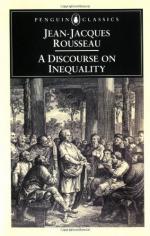
|
| Name: _________________________ | Period: ___________________ |
This test consists of 5 multiple choice questions, 5 short answer questions, and 10 short essay questions.
Multiple Choice Questions
1. Describe what Rousseau felt the following did NOT do for human morals in regard to the arts and sciences.?
(a) Affect them.
(b) Worsen them.
(c) Improve them.
(d) Strengthen them.
2. What good definition is hard to find, according to Rousseau?
(a) Natural law.
(b) Natural greed.
(c) Human law.
(d) Human greed.
3. Why does Rousseau think men lie under restraint?
(a) To feel control.
(b) So they can hide their motives and suppress them.
(c) To be controlled.
(d) He doesn't think they lie.
4. What type of rights does Rousseau want the cities in his State to have?
(a) To vote.
(b) To make peace.
(c) To make laws.
(d) To make war.
5. What is much disagreement made over, according to Rousseau in "Chapter 3, A Discourse on the Origin of Inequality, Dedication and Preface"?
(a) The nature of man.
(b) The evolution of man.
(c) The nature of greed.
(d) The evolution of greed.
Short Answer Questions
1. What does Rousseau write was required in order to reach a new period of reason?
2. What was the result of the arts and sciences becoming despotic, according to Rousseau?
3. Which other civilizations were NOT mentioned by Rousseau as being impacted by the progress of art?
4. What does Rousseau hope the citizens are able to keep?
5. How do modern centuries see natural law?
Short Essay Questions
1. Discuss how Rousseau views passions and sensation in "Chapter 4, A Discourse on the Origin of Inequality, Part One".
2. Discuss Rousseau's opinion on taxation.
3. How did the arts and sciences directly effect France, according to Rousseau?
4. Where does Rousseau believe many civilizations believe science arose from according to "Chapter 2, A Discourse on the Moral Effects of the Arts and Sciences, Part II"?
5. Describe how Rousseau feels about property rights according to "Chapter 5, A Discourse on the Origin of Inequality, Part Two".
6. According to Rousseau in "Chapter 7, A Discourse on Political Economy" how do Political Societies operate?
7. Explain how Rousseau feels about knowledge as described in "Chapter 3, A Discourse on the Origin of Inequality, Dedication and Preface".
8. Describe the two types of inequality Rousseau sees in humans according to "Chapter 4, A Discourse on the Origin of Inequality, Part One".
9. In "Chapter 5, A Discourse on the Origin of Inequality, Part Two" what do men slowly realize they differ in and how is that important?
10. Describe the type of land Rousseau states he prefers to live in in "Chapter 3, A Discourse on the Origin of Inequality, Dedication and Preface".
|
This section contains 805 words (approx. 3 pages at 300 words per page) |

|




